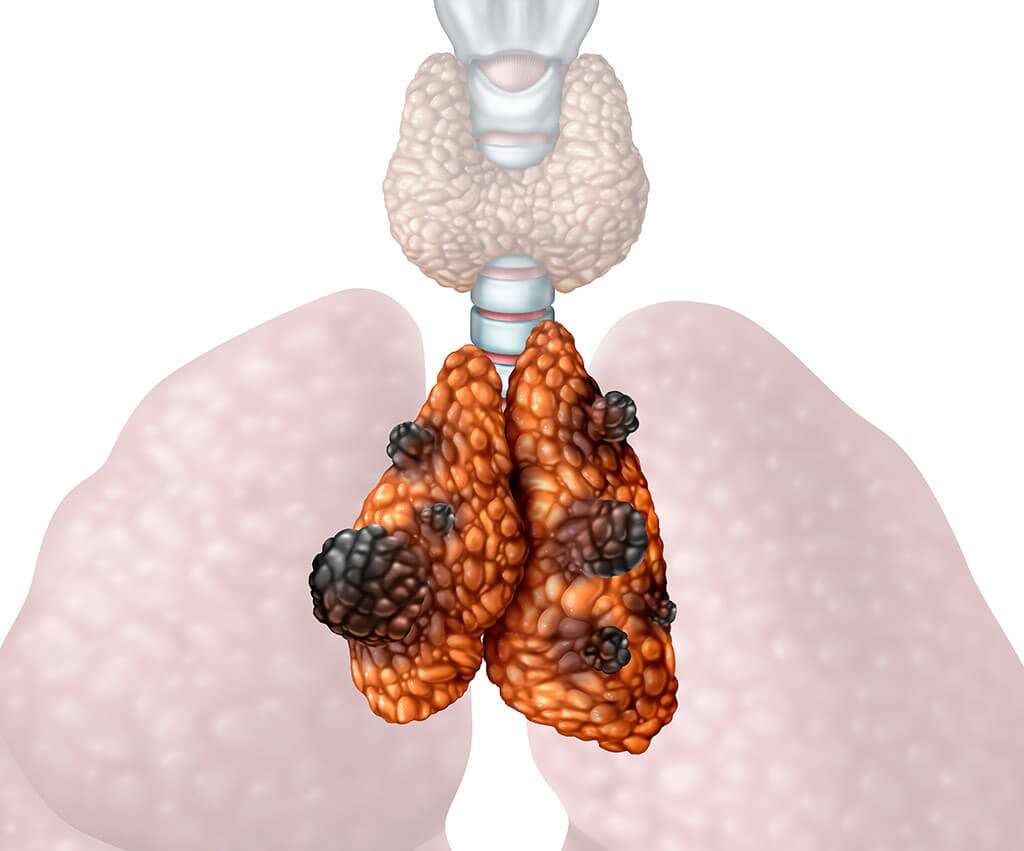Thymus cancer, or type C thymoma, is a rare malignant tumor of the mediastinum that develops from thymic epithelial cells. Sensitive and specific thymus cancer diagnostic methods include high-resolution computed tomography, selective angiography, and radioisotope scanning. The optimal surgical treatment is a thymectomy, while additional treatments may include radiation therapy, chemotherapy, and targeted therapy. When treated by experienced oncologists and thoracic surgeons, the 5-year survival rate for this type of cancer reaches 68%.
Content
- Clinical manifestations of thymus malignancies
- Preoperative diagnostics
- Selection of the optimal treatment method
- Leading hospitals and cost of thymus cancer treatment
- Treatment of thymus cancer in specialized clinics with Booking Health
Clinical manifestations of thymus malignancies
The symptoms of thymus cancer are nonspecific and, as a rule, indicate only the presence of a quite large neoplasm in the mediastinum. Myasthenia gravis, which is pathognomonic for thymus pathologies, can develop both in cancer and in benign neoplasms. Oncological alertness should arise in the presence of the following signs:
- retrosternal chest pain, a feeling of pressure, or squeezing in the chest;
- treatment-resistant chronic dry cough;
- shortness of breath with minimal physical activity;
- weak muscles in the upper body, difficulty chewing and swallowing, respiratory disorders (myasthenia gravis);
- swelling of the face, hands, and upper body; bluish complexion; expanded veins of the face, neck, and chest (superior vena cava syndrome).
As a rule, low grade small tumors can be detected by chance during an X-ray examination for other diseases of the chest organs.
Preoperative diagnostics
Given the rarity of thymic malignancies, their diagnostics and treatment are carried out by specialized international organizations, such as the International Thymic Malignancy Interest Group (ITMIG), the European Association for Cardio-Thoracic Surgery (EACTS), the Japanese Association for Research on the Thymus (JART), and others.
A number of scientists consider the division of thymic neoplasms into benign and malignant, conditional and not always dependent on the results of a histological examination. Thus, regardless of the histological structure, thymomas can be considered malignant when they go beyond their capsule and grow into the neighboring chest organs. At the same time, neoplasms with histological signs of atypia can be considered benign in the absence of infiltrative growth and/or metastasizing.
The advanced diagnostics of thymus cancer include:
- Contrast-enhanced MRI or CT scanning of the chest organs to assess the location of the tumor, detect any invasion into the neighboring organs, and detect lymph node involvement. The alternative imaging methods for an anterior mediastinum examination include X-ray, mediastinography, and gallium radioisotope scanning.
- Ultrasound examination of the supraclavicular areas for assessing the condition of the lymph nodes and fatty tissue.
- Assessing the patient's general condition: complete blood count, biochemical analysis with an assessment of kidney and liver function, coagulation profile, ECG, and consultations with specialized doctors.
When possible, a preoperative immunohistochemical study is carried out to determine the subtype of the neoplasm and plan the individual treatment. The histopathologists evaluate the expression of p53 protein and bcl2, proliferative activity (Ki-67 index), as well as the morphological structure of the tumor (squamous, basaloid, mucoepidermoid, clear cell, and others).
Selection of the optimal treatment method
When choosing a therapeutic technique, oncologists take into account the size of the tumor, the degree of its invasion into the surrounding organs, the presence of distant metastases, as well as the patient's general health state. The main treatment method is the surgical removal of the tumor, which can be supplemented by chemotherapy, radiation therapy, or the prescription of targeted agents.
In cases with small neoplasms without any signs of invasion into other organs of the mediastinum, oncologists prefer surgery – thymus resection or thymectomy. Both surgical procedures can be performed thoracoscopically, with the introduction of surgical instruments through small punctures in the chest. If a thoracic surgeon needs a more extensive surgical field, he will use open access, opening the chest and connecting the patient to a heart-lung machine. In modern surgical clinics, the risk of blood loss and excessive trauma to healthy tissues is minimized due to the use of ultrasonic scalpels, electric coagulators for blood vessels, and devices for layer-by-layer suturing of surgical wounds.
Should there be an invasion into the surrounding organs and no metastases, oncologists make a choice between the immediate surgical removal of the tumor and preliminary chemotherapy and/or radiation therapy. The operation can be performed when the surgeon considers it possible to remove the tumor totally.
When detecting local and distant metastases, doctors consider each of the metastatic foci as an independent tumor and plan treatment based on this. In such a situation, methods of choice are irradiation on the latest generation of linear accelerators and systemic therapy – the prescription of chemotherapeutic cisplatin-containing drugs and targeted therapy (for example, an oral multikinase inhibitor sunitinib).
Leading hospitals and cost of thymus cancer treatment
Treatments of malignant tumors of the thymus are carried out in the Departments of Thoracic Surgery. Where possible, endoscopic interventions are performed that are tolerated better and are associated with lower risks.
The following hospitals specialize in the treatment of thymus cancer:
- Martha-Maria Hospital Munich, Department of General, Abdominal, Vascular, and Thoracic Surgery
- University Hospital Ulm, Department of Cardiothoracic Surgery
- University Hospital Carl Gustav Carus Dresden, Department of Abdominal, Thoracic, and Vascular Surgery
- University Hospital Marburg UKGM, Department of Abdominal, Thoracic, and Vascular Surgery
- University Hospital Frankfurt am Main, Department of Cardiothoracic Surgery
The average cost of examination in suspected thymus cancer is €3,250, the average cost of surgical removal of the tumor is €25,290.
Treatment of thymus cancer in specialized clinics with Booking Health
Thymus cancer is an extremely rare tumor, and therefore, only a limited number of clinics specialize in its treatment. As a medical tourism operator, Booking Health helps patients contact specialized clinics and doctors who demonstrate the highest success rates in the treatment of this pathology.
The specialists of Booking Health will also help you with the following important issues:
- direct communication with your attending physician;
- preliminary preparation of the examination and treatment program;
- control of the cost of clinic services, elimination of overpricing and additional coefficients for foreign patients (saving up to 50%);
- making an outpatient appointment on the desired date, booking a patient room for inpatient treatment;
- independent control of the medical program at all its stages;
- insurance against the cost of treatment increasing, in case of complications (а coverage of €200,000, valid for 4 years);
- if necessary, assistance in buying and forwarding medicines;
- communication with the clinic after the completion of the medical program;
- control of invoices and compensation of unspent funds;
- organization of additional examinations, follow-up tests, and distance consultations;
- top-class service: booking accommodation, tickets, and transfers;
- services of a personal medical coordinator and an interpreter.
Choose treatment abroad and you will for sure get the best results!
See the interview for more information:
INNOVATIVE TYPES OF RADIATION THERAPY FOR CANCER – interview with Dr. med. Peter Stoll
Authors:
This article was edited by medical experts, board-certified doctors Dr. Nadezhda Ivanisova, and Dr. Bohdan Mykhalniuk. For the treatment of the conditions referred to in the article, you must consult a doctor; the information in the article is not intended for self-medication!
Our editorial policy, which details our commitment to accuracy and transparency, is available here. Click this link to review our policies.
Sources:
Centers for Disease Control and Prevention
Read:
Why Booking Health - questions and answers
How to make right decision when choosing the clinic and specialist
7 reasons to trust to the rating of clinics on the Booking Health portal
Don't know where to start?
Contact Booking Health







